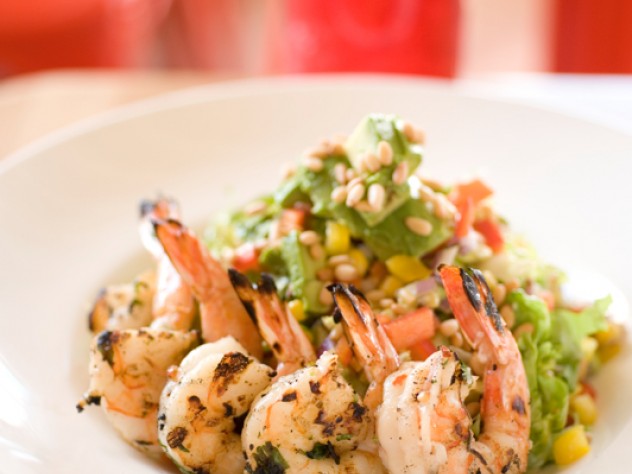Gardening, mixing, and tossing in Santa Fe
THE HIGH DESERT and gourmet salads; experience as both a fashionista and a farmer. Unlikely pairings apparently come naturally to Erin Wade ’03, farmer, chef, and owner of Vinaigrette, a salad bistro in Santa Fe. The menu at her 68-seat establishment (100 seats in the summer, when the patio is open) offers about 20 varieties of salad daily—and her creations have a way of hitting the palate with aplomb. Consider the robust Apple-Cheddar Chop ($15.95)—grilled pork tenderloin over peppery baby arugula, julienned green apples, pickled fennel, and sharp cheddar, chopped and tossed in a ruby port vinaigrette, or the relatively light Eat Your Peas ($9.95)—fresh baby lettuce and sweet green peas with crunchy bacon shards, savory white mushroom sauté, and Asiago cheese with a tart vinaigrette. Should you come during the growing season (roughly late May to late September), there’s a good chance that Wade will have picked your greens herself that very morning.
She began to think seriously about food after college, while studying to become a fashion designer in Milan. “The Italian attitude toward pleasure and food, it’s infectious,” she says. “It’s this sense of entitlement—that everyone deserves good food.” A Milanese pizzeria that featured more than 100 different pizzas, ranging from kiwi and taleggio to Gorgonzola and hazelnut, inspired her; all were “simple, fresh, and healthy.” “As a woman coming out of college, I was looking for a way of eating, a philosophy of eating, that wasn’t deprivational,” she recalls. “I wanted to eat in a way that was loving and nurturing.”
Wade tends her three-acre garden, with a 1,200-square-foot greenhouse, in Nambé, a hamlet 20 miles north of Santa Fe, with help from one other gardener. Her family bought the 10-acre parcel of land, including the 300-year-old adobe fixer-upper where she now lives, in 2003 as a family redoubt, but Wade moved in after returning from Milan unclear about her career plans.
In 2004, she began planting cover crops like alfalfa and legumes to replenish the soil’s nitrogen, and began trying to irrigate, a task far more complicated than she’d first expected, given the area’s written and unwritten rules governing water rights. “Whiskey’s for drinking, the saying goes around here,” Wade says, “water’s for fighting.” But by 2005, a small patch was ready for planting in raised beds—and the dream of opening a restaurant was blooming, too. In 2008, with help from her family, a large line of credit, and considerable faith in her untested business plan, she opened Vinaigrette.
“I picked every dish, tin, plate, chair, table, and lamp,” Wade says. “Designing was a natural extension of my background, and a hell of a lot easier for me than the work of running a restaurant!” For help in that department, Wade enlisted an operations manager and a kitchen consultant. “I will say that it wasn’t easy, in this male-dominated industry, to find people I could work with who checked their ego and listened to me—a skinny white chick with no experience.” But Wade brought her salad acumen, fine-tuned during her years living on the farm, and the concept. And the pairings have worked: steady growth, bustling lunch and dinner crowds, and rave reviews (including two mentions in the New York Times).
She now raises about 70 percent of Vinaigrette’s produce on her own land, and whatever happens to be thriving inspires her salad creations. The high desert air produces particularly peppery arugula, for instance—hence the idea of balancing it with sweet dried cherries and toasted pecans in the Cherry Tart ($8.95). Other salads, like Appeasement, start from a story—in that case, about a couple of grumpy customers who needed mollifying. “The fact that peas and mint are a classic culinary pairing got me thinking…but how to combine them?” she recalls. “Mint is used frequently in Thai cooking, so I thought of peanuts and obliquely of black sesame seeds, which are common in Asian cuisines—and because I find mint too harsh by itself, I began to think about it in the dressing. So I ended up with Appeasement [(a-peas-mint)]—crisp green cabbage, sugar snap and snow peas, and radish, with chopped peanuts, black sesame seeds, and a creamy mint-ginger vinaigrette.”
The grumpy couple, apparently, never returned, but Wade considers the salad name emblematic of what running a restaurant requires. “When you can turn a negative experience into a positive one by apologizing, admitting fault, sending out dessert or comping the whole shebang—whatever kind of appeasement is necessary—you often cultivate your most loyal and devoted customers.”
Of moving to New Mexico, learning to farm, and opening Vinaigrette with no restaurant experience, Wade says, “It was a big leap of faith. I was convinced I was going to be dressed in a sleazy carrot costume begging people to come in off the street.” But she says also that she knew, in part from her experience at Harvard, that “ideas matter. No one thought it was going to work, but I believed in this. I knew it would work. People need it.”


